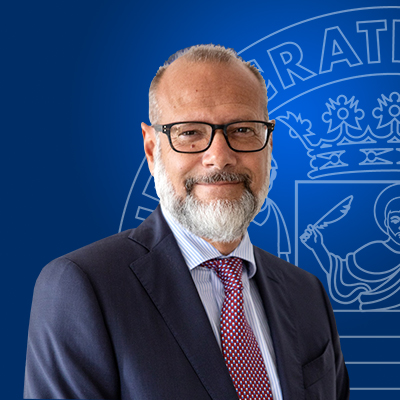
Quantum Computing: New Challenges and Opportunities for a Safer World
Prof. Vicenzo Loia
Rector of University of Salerno, Italy
Biography
Vincenzo Loia received the graduation degree in Computer Science from the University of Salerno, Salerno, Italy, in 1985, and the Ph.D. degree in Computer Science from Université Pierre & Marie Curie Paris VI, Paris, France, in 1989. He is currently the Rector of the University of Salerno and a Full Professor of Computer Science within the same institution. He has authored more than 350 scientific papers, published in international conference proceedings, book chapters, and prestigious journals. He holds various editorial roles for numerous international journals. He is also the Founder and Editor-in-Chief of the international journal Ambient Intelligence and Humanized Computing. His research interests include solving complex problems using new paradigms in software design and programming, including semantic technologies, Description Logic, Fuzzy Logic, data analysis for knowledge extraction, AI-driven decision support systems based on cognitive architectures, computational intelligence, granular computing and Quantum Computing.
Abstract
As the era of Quantum Technology advances, the risk of quantum-based attacks capable of breaking conventional encryption becomes increasingly realistic. This is particularly concerning for Blockchain and Trustworthy Systems, which depend heavily on cryptographic mechanisms to ensure full security. The emergence of quantum computing introduces serious challenges, as existing blockchain infrastructures rely on cryptographic algorithms that are susceptible to quantum breakthroughs. One of the most vulnerable algorithms is the widely adopted Elliptic Curve Digital Signature Algorithm (ECDSA), which experts warn could be compromised as early as 2027, according to the most optimistic forecasts. Furthermore, the shift to post-quantum cryptography raises critical questions about the associated costs, including energy consumption and the additional storage required to implement these new cryptographic methods.
The tremendous computational power of quantum devices holds the potential to significantly contribute to building a more reliable and secure world. However, this power also brings the risk of exploitation, putting numerous systems in jeopardy. To safeguard the digital environment and ensure the privacy and security of people worldwide, implementing strict regulations and advanced quantum security techniques will be crucial.

New Security Directions and Challenges for Infrastructure Operators in an Evolving EU Landscape
Mr. Jean-Philippe Wary
Systems & Products Security Research Program Director, Orange Innovation
Biography
Jean-Philippe Wary currently manages a Security Research Program (within Orange R&D Labs since 2011) on Systems and Products Security. One of his major interests is to investigate new security models and schemes to deliver and operate on Demand Security SLA (Security Level Agreement) businesses and support new certification schemes (ENISA Certification schemes & new EU Directives NIS2 / CRA / DORA…). He holds over 60 families of international patents in telecom, services, and security.
Abstract
Multiple European cybersecurity regulations are set to take effect in the coming years, while cybersecurity certification schemes and frameworks for targeted infrastructures remain under discussion. The complexity arising from these multiple (existing and emerging) sector-specific regulations, which must be applied to large infrastructures such as 5G, 6G, and Cloud, combined with the vast number of targeted infrastructures across Europe, makes manual implementation practically unfeasible. This keynote outlines the known constraints, identifies the requirements to be addressed, and suggests potential solutions along with the associated challenges to advance toward the automation and industrialization of these certifications.

Control Systems and Computer Science Intersections With The Most Powerful Operational Laser System Worldwide
Dr. Habil. Daniel Ursescu
Head of Laser System Department, Extreme Light Infrastructure – Nuclear Physics (ELI-NP), National Institute for Physics and Nuclear Engineering – Horia Hulubei (IFIN-HH), Magurele, Romania
Biography
After finishing the BSc studies and MSc Studies at the University of Bucharest, Daniel Ursescu went to Germany and obtained the PhD title for an experimental work performed at GSI, Darmstadt, related to experimental x-ray laser development for in-ring Li-like ions spectroscopy aimed to measure their nuclear properties.
After one more year as a PostDoc in GSI at PHELIX PW-class laser system, he returns to Romania and immediately is involved in the ELI-NP project, in various research and, later, management positions (including head of two ELI-NP departments) until today. Since 2018, he has been an Associate Professor at the Physics Doctoral School of the University of Bucharest (coordinated 9 students, among whom 2 have already finished their PhD) and co-supervises 3 doctoral students at TU Darmstadt, Germany.
Abstract
The High Power Laser System (HPLS) of the Extreme Light Infrastructure Nuclear Physics research facility in Romania is the most powerful operational laser system worldwide. To reach this point, but also to go beyond, an essential part is the system development based on a robust engineering approach, which includes specific aspects of Control Systems and Computer Science.
After presenting the laser system, several examples of recent work will be introduced, from laser power stabilization and stabilization of the relative delay between the pulses from the two amplification arms with an accuracy of 11 fs, to complementary work on data sorting using neural networks, data analysis, and image processing.

Dynamic Digital Twins and Artificial Intelligence Technologies
Prof. Dimitris Karagiannis
Research Group of Knowledge Engineering, Faculty of Computer Science, University of Vienna, Vienna, Austria
Biography
Dimitris Karagiannis is an Emeritus professor at the University of Vienna. Since 1993, he has led the Research Group Knowledge Engineering. His main research interests include modelling methods, meta-modelling, knowledge engineering, business process management, enterprise architecture management, and artificial intelligence. Besides his engagement in national and EU-funded research projects, Dimitris Karagiannis is the author of research papers and books on Knowledge Databases, Business Process Management, and Knowledge Management.
He is the initiator and coordinator of the OMiLAB Book Series on “Domain-Specific Conceptual Modelling: Concepts, Methods and ADOxx Tools”. He serves as an expert in various international conferences and is on the editorial board of several international journals. The industrial application of his meta-modelling research was demonstrated within the BOC Group, a European software and consulting company founded in 1995.
The scientific applications of his research are applied in the OMiLAB (Open Models Initiative Laboratory), an open collaborative environment for modelling method engineering, which he is the founder of and the scientific lead of its international educational platform, the NEMO Summer School Series, and the NEMO Innovation Camps.
Abstract
In this invited talk, the term Dynamic Digital Twins will be introduced as an adaptive digital representation of systems capable of reflecting structural and contextual changes in a given environment to enable intelligent adaptations and operations beyond mere data updates. Unlike the traditional Digital Twin concept, which is primarily used to observe and control data flows, Dynamic Digital Twins can adapt to dynamically evolving environments, enabling more agile and autonomous system behavior. In addition, foundational artificial intelligence (AI) capabilities are explored, including classification, recognition, prediction, and generation, and how these capabilities can address the needs of various applications is shown.
Concrete examples will be drawn from Design Thinking, conceptual modeling, and IoT-based environments, all of which can significantly benefit from integrating AI support. The talk will conclude by outlining emerging research directions, including the ambition to enhance human-AI collaboration and shape the next generation of intelligent, self-adaptive systems.

Anticipatory Networks and Their Applications in Robotics
Prof. Andrzej Maciej Skulimowski
Decision Science Laboratory, AGH University of Science and Technology, Kraków, Poland
Biography
Andrzej M.J. Skulimowski is a Full Professor at the AGH University, Director of Decision Science Labo¬ratory and President of the Progress & Busi¬ness Foundation, Kraków, Poland. He graduated with the M.Sc. in Electronics degree from the AGH University, summa cum laude, and M.A. in Theoretical Mathema¬tics from the Jagiellonian University, Kraków. He obtained his PhD in Automatic Control with honors in 1985 and a D.Sc. degree in Operations Research in 1997, both from the AGH University.
His main fields of expertise cover intelligent robotics, multicriteria decision analysis, decision support systems, risk management, and forecasting. He was the Fellow of the Swiss Confederation at the ETH Zurich (1987-88), a SNF Research Associate at the Institute of Communication Technology at the ETH (1988-90), and a Visiting Professor at the Institute of Information Management at the University of St. Gallen (1990-1995).
He has been a guest lecturer in many other universities a.o, in Belgium, France, Japan, Taiwan, UK, USA. He published 11 books and over 300 scientific papers in journals such as Exp. Syst. Appl., IEEE Multimedia, Int. J. Syst. Sci, JASIST, Math. Comp. Modelling, Technol. Forecast. Soc. Change, and as book chapters. Prof. Skulimowski supervised over 120 information technology implementation and know-how transfer projects, most of them referring to AI and robotic technologies.
Abstract
Anticipatory networks (ANs) generalize and extend the theory of anticipatory systems, which has recently experienced a rising popularity in autonomous robotics. The decision analysis in ANs is based on an assumption that the preference model of a decision maker linked by a causal relation with another one considers the outcomes of future decision problems that this agent solves. The relevant future decisions are indicated by the so-called anticipatory feedback relation. In this lecture, we will present constructive algorithms that have been designed and implemented to model the anticipatory behavior of causally connected decision makers, specifically teams of autonomous mobile robots. The robot formations are modelled as evolving ANs governed by discrete event systems with virtual supervisors.
We will provide several illustrative examples referring to finding an optimal formation evolution strategy for teams of autonomous agricultural and space robots, as well as organizing efficient evacuation activities in case of a disaster emergency.
